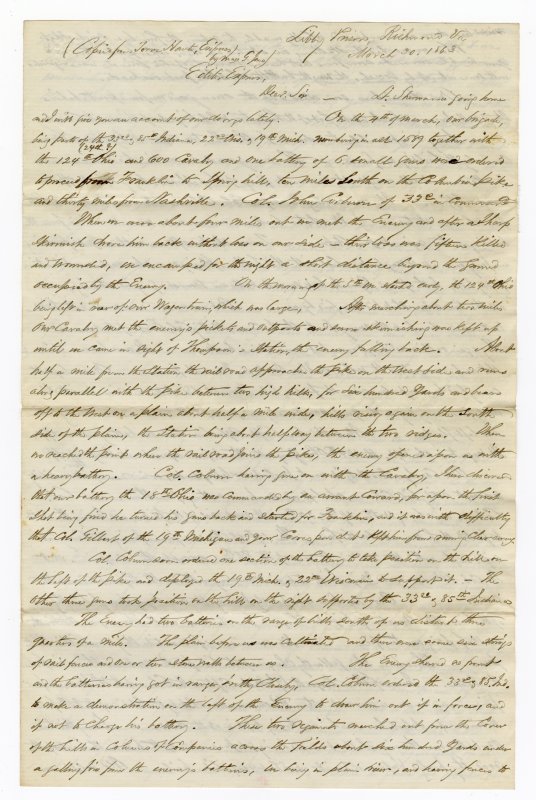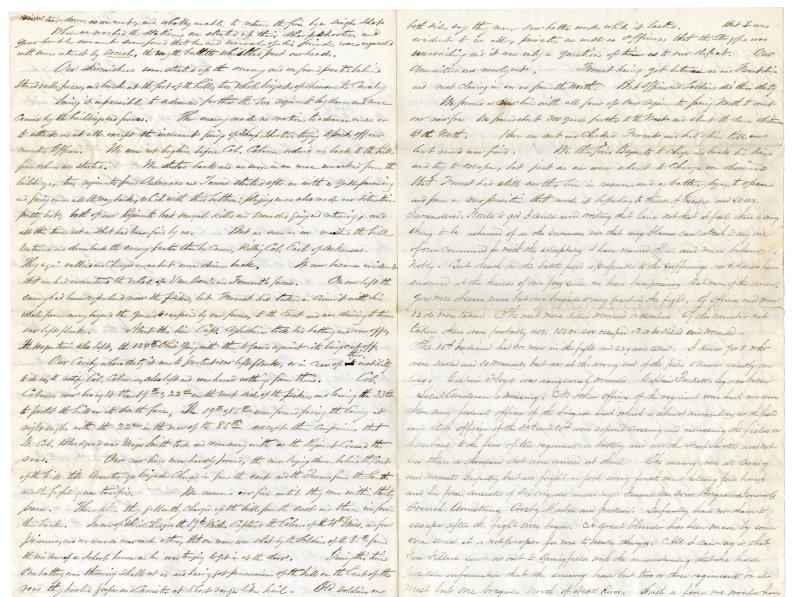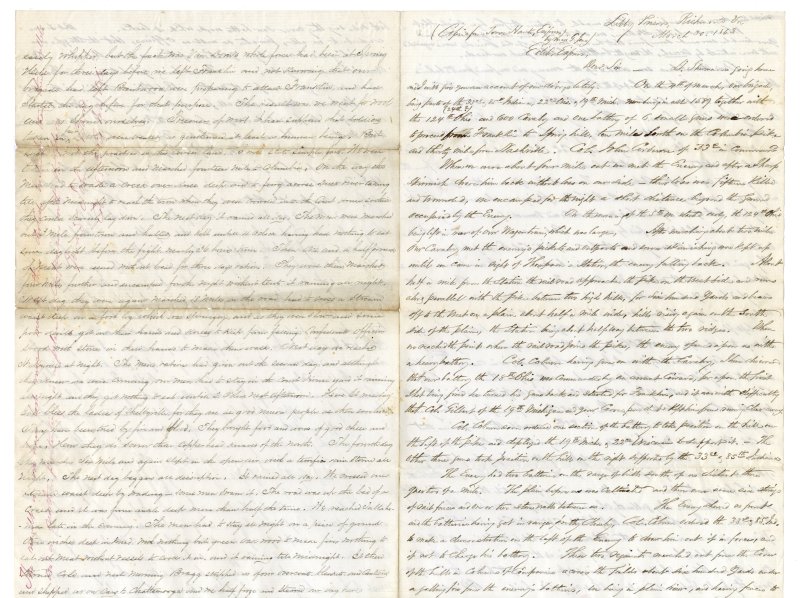85th Indiana Infantry - Battle of Thompson Creek, TN - Libby Prison Camp
Item LTR-9691
March 30, 1863
Colonel John P. Baird
Price: $550.00
Description
Original Civil War soldier's letter. 4 pages, written in period ink.Libby Prison
Richmond, Virginia
March 30, 1863
Copied from Terre Haute Express
By Major G. Jones
Editor Express
Dear Sir,
Lieutenant Sherman is going home and I will give you an account of our doings lately.
On the 4th of March, our brigade being part of the 33rd and 85th Indiana, 22nd Ohio, 19th Michigan, numbering in all 1589 together with the 124th (24th ?) Ohio and 600 cavalry and one battery of 6 small guns was ordered to proceed from Franklin to Spring Hills, ten miles south on the Columbia Pike and thirty miles from Nashville. Colonel John Coburn of the 33rd in command.
When, on or about four miles out, we met the enemy and after a sharp skirmish drove him back without loss on our side. Their loss was fifteen killed and wounded. We encamped for the night a short distance beyond the ground occupied by the enemy.
On the morning of the 5th, we started early, the 124th Ohio being left in rear of our wagon train, which was large. After marching about two miles, our cavalry met the enemy’s pickets and outposts and soon skirmishing was kept up until we came in sight of Thompson’s Station, the enemy falling back. About half a mile from the station, the rail road approaches the Pike on the west side and runs along parallel with the Pike, between two high hills for six hundred yards and bears off to the west on a plain about half a mile wide. Hills rising again on the south side of the plain, the station being about half way between the two ridges. When we reached the point when the rail road joins the Pike, the enemy opened upon us with a heavy battery.
Colonel Coburn having gone on with the cavalry, I here discovered that our battery, the 18th Ohio, was commanded by an arrant coward. For upon the first shot being fired, he turned his guns back and started for Franklin. And it was with difficulty that Colonel Gilbert of the 19th Michigan and your correspondent kept him from running clear away.
Colonel Coburn soon ordered one section of the battery to take position on the hill on the left of the Pike and deployed the 19th Michigan and 22nd Wisconsin to support it. The other three guns took position on the hill on the right, supported by the 33rd and 85th Indiana.
The enemy had two batteries on the range of hills south of us, distant three quarters of a mile. The plain before us was cultivated and there were some six stories of rail fences and one or two stone walls between us. The enemy showed no point and the batteries having got in range, pretty closely. Colonel Coburn ordered the 33rd and 85th Indiana to make a demonstration on the left of the enemy to draw him out, if in force, and if not to charge his battery. These two regiments marched out from the cover of the hills in columns of companies across the fields about six hundred yards under a galling fire from the enemy’s batteries, in being in plain view and having fences to tear down as we went and wholly unable to return the fire by a single shot.
When we reached the station, we started up their sharpshooters and your humble servant soon found that he and several of his friends were regarded with some interest by secesh, the way the bullets whistled past overhead.
Our skirmishers soon started up the enemy and we found posts behind the walls, fences and brush at the foot of the hills, two whole brigades of dismounted cavalry. Seeing it impossible to advance further the two regiments lay down and were covered by the buildings and fences. The enemy made a motion to advance on as or to attack us at all except the incessant firings of sharpshooters trying to pick off our mounted officers. We were not long here before Colonel Coburn ordered us back to the hill from whence, we started. We started back and as soon as we were unmasked from the buildings, two regiments from Arkansas and Texas starter after us with a firing on us all the way back. Which with their batteries playing on us also made our situation pretty hot. Both of our regiments lost several killed and wounded going and returning and all the time not a shot had been fired by us.
But as soon as we reached the hill we turned and drove back the enemy faster than he came, killing Colonel Earl of Arkansas. They again rallied and charged on us but were driven back. It became evident that we had encountered the whole of Van Dorn’s and Forrest’s forces.
On our left the enemy had been reported near the Pike. But Forrest had taken a circuit with his whole force away beyond the ground occupied by our forces, to the east and was desiring to turn our left flank.
About this time, Captain Aleshire took his battery and ran off. The wagon train also left, the 124th Ohio going with them to guard against its being cut off.
Our cavalry, whose duty it was to protect our left flank, or in case of their inability to do so, to notify Colonel Coburn, also left and we heard nothing from them. Colonel Coburn now brought the 19th and 22nd on the west side of the Pike and leaving the 33rd to protect the hill on its south face. The 19th and 85th now formed facing the enemy at right sides with the 22nd in the rear of the 85th, except those companies that Lieutenant Colonel Bloodgood and Major Smith took and ran away with, as the regiment crossed the road.
Our new lines were hardly formed, the men laying down behind the crest of the hill till Armstrong’s Brigade charged in from the east and the Texans from the south and the fighting was terrific. We reserved our fire until they were withing thirty paces. Three times they gallantly charged up the hill from the east and thrice we force them back. In one of the charges, the 19th Michigan, captured the colors of the 4th Mississippi and four prisoners and we were so near each other, that our men was shot by the soldiers of the 85th from the window of a school house as he was trying to get in at the door.
During this time, one battery was throwing shells at us and having go possession of the hill on the east of the road, they hurled grape and canister at short range like hail. Old soldiers on both sides say they never saw hotter work while it lasted. But it was evident to us all, privates as well as officers, that the struggle was unreeling and it was only a question of time as to our defeat. Our ammunition was nearly out. Forrest having got between us and Franklin and was closing in on us from the north. But officers and soldiers did their duty.
We formed a new line with all four of our regiments facing north to meet our new foe. We formed about 300 yards further to the west and about the same distance to the north. Here we met and checked Forrest and held him till our last round was fired. We then fixed bayonets to charge and break his lines and try to escape. But just as we were about to charge, we discovered that Forrest had still another line in reserve and a battery began to open and from a new position that made it hopeless to think of escapes and so we surrendered. Would to God I could avoid writing that line. Not that I feel there is anything to be ashamed of in the surrender, nor that any blame can attach to anyone of our command for with the excepting I have named officer and men behave nobly. But death on the battlefield is preferable to the sufferings our soldiers have endured at the hands of our foes since we have been prisoners. But more of this now. You will observe none but our brigade to any part of the fight. Of officers and men, 1206 men taken. The rest were killed, wounded or escaped. Of the number not taken, there were probably 400. 150 or 200 escaped, 50 or 60 killed and wounded.
The 85th Indiana had 300 men in the fight and 229 were taken. I know 7 or 8 who were killed and 30 wounded, but was at the wrong end of the line to know exactly our loss. Captain Floyd was dangerously wounded. Captain Puckett’s leg was broken. Lieutenant Anderson is mission. No other officers of the regiment were lost nor were there any federal officers of the brigade hurt. Which iss almost miraculous as the field and staff officers of the 33rd and 85th were exposed crossing and recrossing the field on horseback to the fire of ten regiments or battery and all the sharpshooters and not less than a thousand shots were aimed at them. The enemy were all cavalry and mounted infantry but all fought on foot. Every fourth man holding four horses and his force consisted of six brigades under Major General Van Dorn, Brigadier General French, Armstrong, Crosby, Martin and Jackson. Infantry had no chance to escape after the fight once began. A great blunder has been made by someone and it is not proper for me to make charges. All I can say is that General Gilbert sent us out to Springfield with the understanding that he had position information that the enemy had but two or three regiments or at most but one brigade north of Duck River. Such a force we would have easily whipped. But the fact was Van Dorn’s whole force had been at Spring Hill for three days before we left Franklin and not knowing that our brigade had left Brentwood were preparing to attack Franklin and have started the day before for that purpose. The result was we went for war and shown ourselves. Prisoners of war. I had supposed that soldiers taken in fair battle were treated as gentleness at least as human beings. But such is not the practice in this cursed land. I will state simple facts. We were taken in the afternoon and marched fourteen miles to Columbia. On the way the men had to wade a creek over knee deep and to ferry across Duck River taxing till often midnight to reach the train when they over crowded into the court house so they could scarcely lay down. The next day it rained all day. The men were marched out 3 miles from town and halted and kept until 4 o’clock having had nothing to eat since daylight before the fight, nearly 36 hours time. Then one and a half pounds of meat were issued without bread for three days rations. They were then marched four miles further and encamped for the night without tents. It raining all night. Next day they were again marched 18 miles on the road, had to cross a stream waist deep on a foot log which was springery and as they were slow and some poor devils got on their hands and knees to keep from falling. Confederate officers stood with stones in their hands to make them walk. Next day we reached Shelbyville at night. The men’s rations had given out the second day and although they knew we were coming, our men had to stay in the court house yard, it raining all night and they got nothing to eat until 2 o’clock next afternoon. Here let me say, God bless the ladies of Shelbyville. For they are as good union people as there ever lived. They have been tried by fire and blood. They brought food and words of good cheer and hope. How they do scorn those copperhead knaves of the north. The fourth day they marched six miles and again slept in the open air with a terrific rain storm all night. The next day begs all description. It rained all day. We crossed one stream waist deep by wading – some men swam it. The road was up the bed of a creek and it was from ankle deep more than half the time. We reached Tallahassee late in the evening. The men had to stay all night on a piece of ground three inches deep in mud with nothing but green oak wood to make fires. Nothing to eat but meat without vessels to cook it in and it raining till midnight. It then turned cold and next morning Bragg stripped us from overcoats, blankets and canteens and shipped us on cars to Chattanooga and we half froze and starved our way there.
The result is we half lost more men by this devilish treatment than through bullets and a northern penitentiary is a palace in comparison with this place.
Yours,
John P. Baird
Colonel
85th Regiment Indiana Volunteers



